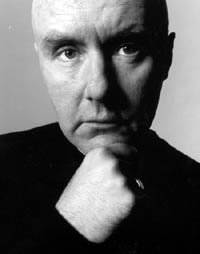Irvine Welsh (b.1961)

Irvine Welsh was born in Leith, Scotland, in 1961. He moved to the Muirhouse area of Edinburgh with his family at the age of four and was schooled at Ainslee Park Secondary School until sixteen. When he left school he completed a City Guild course in electrical engineering and worked as an apprentice TV repairman until an electric shock brought his career to a sudden end.
He moved into other areas of work, becoming the guitarist for a London punk band in 1978 then working for Hackney Council in London. He studied computing and worked during the London property boom of the 1980s before returning to Edinburgh to work for the City Council housing department. He enrolled at Heriot Watt University and studied for an MBA, writing a thesis on creating equal opportunities for women.
Welsh moved into writing when he published several short stories, which would later form the basis of his most famous work, in DOG Magazine, and New Writing Scotland. Parts of the novel also appeared in Clocktower pamphlets, A Parcel of Rogues, Past Tense: Four Stories from a Novel and Rebel Inc.
Welsh was recommended to Robin Robertson, the editorial director of Secker & Warburg, who decided to publish Trainspotting as a full novel, despite believing that it had no chance of selling. A story of drugs, violence and poverty in the slums of Edinburgh’s schemes, it was seen by some as a definitive guide to Edinburgh in the 1980’s or a slur on the city’s good name by others. It was published in 1993 and Irvine Welsh shot to international fame overnight.
Trainspotting was rejected for the Booker Prize shortlist after offending two of the female judges but despite this unease from the critical establishment, Welsh’s novel received rave reviews. The novel changed popular fiction forever, such was its power and reputation. Written in the phonetic Scottish dialect, it became an underground classic with legendary status among a cross-section of Scotland’s populace.
Harry Gibson’s stage adaptation of the novel was premiered at the Glasgow Mayfest in April 1994 and went on to be staged at the Edinburgh Festival and in London before touring the UK. In August 1995, Irvine Welsh was able to give up his day job.
Welsh’s work after Trainspotting has been varied but not profuse. A collection of short stories, Acid House, was published in 1994, followed by his second novel, Marabou Stork Nightmares in 1995, and Ecstasy in 1996. With the publication of the Filth in 1998, Welsh hot the controversial headlines once more by depicting an Edinburgh copper as a pig on the front cover. The book was banned from display for a time until the furore blew over.
In May 2001 Welsh published Glue, a sprawling novel that follows four friends across three decades in the familiar territory of Edinburgh's squalid council housing projects. In 2002 Welsh reprised the characters of Trainspotting when he published the sequel, Porno. Ten years have passed in the lives of the characters and much has changed in Leith since then making the comparisons interesting, but the material much the same. In 2005, Welsh collaborated with Ian Rankin and Alexander McCall-Smith to pen a book of short stories for the Edinburgh charity, One City.
Since Trainspotting was released in 1993, Irvine Welsh has remained a controversial figure, whose novels, stage and screenplays, novellas and short stories have proved difficult for literary critics to assimilate, a difficulty made only more noticeable by Welsh’s continued commercial success. It is impossible to deny his impact on Scottish literature and there is no sign of him walking away quietly.
He may not go on to be the best remembered in literary circles, but Welsh has proved he has what it takes to be remembered as one of Scotland greatest writers.

0 Comments:
Post a Comment
<< Home